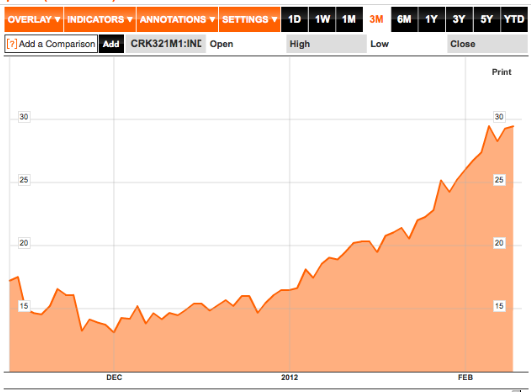By Natsuko Waki
LONDON | Tue Feb 7, 2012 10:00am EST
(Reuters) – Gold prices have been too volatile to play a reliable role as a hedge against inflation, a study of financial assets over the past 112 years showed on Tuesday.
While inflation does not reduce gold’s real value, it has no yield or income flow and the precious metal has given a far lower long-term return than equities.
In the period since 1900, gold gave a real return of 1.1 percent in sterling terms and its value fluctuated widely, the study published by Credit Suisse and London Business School’s Elroy Dimson, Paul Marsh and Mike Staunton.
“Gold is the only asset that does not have its real value reduced by inflation. It has a potential role in the portfolio of a risk-averse investor concerned about inflation,” it said.
“However, this asset does not provide an income flow and has generated low real returns over the long term. Gold can fail to provide a positive real return over extended periods.”
The report said global equities, the best performers among different assets since the start of the 20th century with a 5.4 percent annualized return, beat inflation in the long run.
However, their returns may be more the result of equity risk premium, the reward for holding risky assets instead of risk-free government securities, than rising inflation.
Looking at the relationship between real return and inflation, the research found that equities were not that sensitive to inflation, compared with inflation linked bonds.
For example, a rate of inflation that is 10 percent higher is associated with a real equity return that is lower by 5.2 percent.
When the inflation rate was at least 18 percent, equities suffered a loss of 12 percent on a real basis. Bonds were worse, suffering a loss of over 23 percent.
“Equities are at best a partial hedge against inflation; their nominal returns tend to be higher during inflation, but not by a large enough margin to ensure that real returns completely resist inflation,” the research said.
“Although equities are thought to provide a hedge against inflation, their capacity to do so is limited. While inflation clearly harms the real value of bonds and cash, equities are not immune.”
Inflation-linked bonds have the highest sensitivity to inflation but their yields have fallen in the past few years, providing little contribution to investors wanting to achieve a positive return over the period from investment to maturity.
Equities by far provided the best real return in the 1900-2011 period. Bonds returned 1.7 percent, while bills gave 0.9 percent on an annualized basis.
Read the rest here.
Comments »


